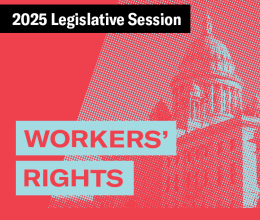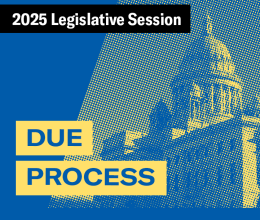The ACLU of RI today filed a sex and age discrimination lawsuit against the Newport Grand Casino on behalf of a female employee who claims that, for a decade, she has been paid significantly less than a younger male employee performing the same duties in the same position. The suit, filed in U.S. District Court by ACLU of RI cooperating attorney Lynette Labinger, is on behalf of Paula Borrelli, who has worked at Newport Grand since 2007 and as a “night manager on duty” (MOD) there since 2008.
In December 2016, at a meeting with the human resources department, Ms. Borrelli learned that after working with a younger male employee in the same position for the past eight years, he was being paid an annual salary more than $4,000 higher than hers. Ms. Borrelli immediately requested a pay equity increase. For the next five months, she repeatedly inquired about the status of her request until it was denied without explanation in May 2017. In the meantime, the Casino, without any internal posting, hired an applicant who was 25 years younger than Ms. Borrelli and had no casino experience for a position whose starting salary was higher than Borrelli’s salary after ten years of employment. Although the position had a different title, Borrelli and her fellow MOD were assigned to train the new hire, whose initial job duties were identical to hers.
The lawsuit argues that the Casino’s actions violate a host of federal and state laws banning workplace discrimination on the basis of sex and age, including a state law banning “wage discrimination based on sex.” Just three weeks ago, the state House of Representatives voted for a bill, which did not pass the Senate, that would have eliminated the right of employees such as Ms. Borrelli to file suit under that law. Among other remedies, the lawsuit seeks a court ruling declaring the Casino’s conduct unlawful, awarding compensatory and punitive damages, and payment of the differential between what Borrelli was paid “and the amount she would have received in the absence of sex and/or age discrimination, including but not limited to incremental increases, bonuses, and benefits.”
Ms. Borrelli said today: “When I became aware that my fellow colleague who is a man was receiving more money than I was for the same job we were both doing, I was quite surprised. So was he. I inquired if I was able to get a raise to bring me up to the same salary, but I was brushed off for months. In the meantime, a younger co-worker was hired to do the same job as me and my fellow colleague and was also paid a higher wage. When I was informed that they were not going to do anything, I was left completely devastated. Throughout my entire employment with Newport Grand I have been a model employee. This ordeal has been unfair and extremely upsetting, and I hope for a resolution that sets an example for other employers who discriminate in this way.”
ACLU of RI attorney Labinger added: “Even though the federal Equal Pay Act has been on the books since 1963, gender inequality in compensation remains an unfortunate reality. Ms. Borrelli’s experience demonstrates the importance of transparency in compensation information, and it demonstrates the critical need for strong anti-discrimination laws to allow victims to vindicate their rights.”
ACLU of RI executive director Steven Brown said: “Ms. Borrelli’s case epitomizes both the deeply-ingrained problem of wage discrimination that too many women routinely face and the need for stronger, not weaker, protections in the law to address this discrimination. That is why, although we rarely handle employment discrimination cases in the private sector, we felt it important to get involved in the case and help bring attention to this important issue.”






